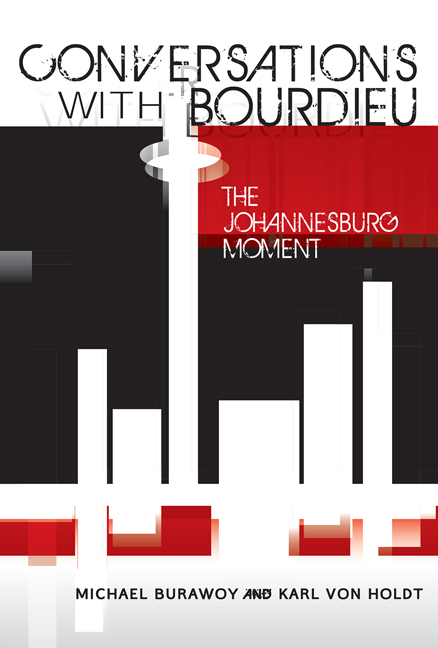Book contents
- Frontmatter
- Contents
- Abbreviations and acronyms
- Preface
- Prologue The Johannesburg Moment
- Acknowledgements
- CONVERSATION 1 SOCIOLOGY AS A COMBAT SPORT
- CONVERSATION 2 Theory and Practice
- CONVERSATION 3 CULTURAL DOMINATION
- CONVERSATION 4 COLONIALISM AND REVOLUTION
- Fanon Meets Bourdieu
- Violence
- CONVERSATION 5 PEDAGOGY OF THE OPPRESSED
- CONVERSATION 6 THE ANTINOMIES OF FEMINISM
- CONVERSATION 7 INTELLECTUALS AND THEIR PUBLICS
- CONVERSATION 8 MANUFACTURING DISSENT
- Epilogue Travelling Theory
- Bibliography
- Index
Fanon Meets Bourdieu
from CONVERSATION 4 - COLONIALISM AND REVOLUTION
Published online by Cambridge University Press: 20 April 2018
- Frontmatter
- Contents
- Abbreviations and acronyms
- Preface
- Prologue The Johannesburg Moment
- Acknowledgements
- CONVERSATION 1 SOCIOLOGY AS A COMBAT SPORT
- CONVERSATION 2 Theory and Practice
- CONVERSATION 3 CULTURAL DOMINATION
- CONVERSATION 4 COLONIALISM AND REVOLUTION
- Fanon Meets Bourdieu
- Violence
- CONVERSATION 5 PEDAGOGY OF THE OPPRESSED
- CONVERSATION 6 THE ANTINOMIES OF FEMINISM
- CONVERSATION 7 INTELLECTUALS AND THEIR PUBLICS
- CONVERSATION 8 MANUFACTURING DISSENT
- Epilogue Travelling Theory
- Bibliography
- Index
Summary
But above all I wanted to get away from speculation – at that time [1960s], the works of Frantz Fanon, especially The Wretched of the Earth, were the latest fashion, and they struck me as being false and dangerous.
Bourdieu (1990 [1986]: 7)What Fanon says corresponds to nothing. It is even dangerous to make the Algerians believe the things he says. This would bring them to a utopia. And I think these men [Sartre and Fanon] contributed to what Algeria became because they told stories to Algerians who often did not know their own country any more than the French who spoke about it, and, therefore, the Algerians retained a completely unrealistic utopian illusion of Algeria … the texts of Fanon and Sartre are frightening for their irresponsibility. You would have to be a megalomaniac to think you could say just any such nonsense.
Pierre Bourdieu, interview in Le Sueur (2001: 282)Bourdieu's stance toward Marxism becomes more hostile as we move from Marx to Gramsci and now to Fanon. Bourdieu is prepared to acknowledge the insights of Karl Marx and, indeed, so many of his ideas find an echo in the writings of Marx. As I suggested in Conversation 2, his theory of cultural domination can be seen as an extension of Marx's political economy from material to symbolic goods. While Bourdieu wants to distance himself from his opposite number in the Marxist tradition, he nonetheless shows a grudging respect by turning Gramsci against Gramsci.
When it comes to Frantz Fanon, the gloves are off, as we see in the rare quotes above, taken from two interviews. I have found no other explicit commentary on Fanon in Bourdieu's works. As with other Marxists, once we allow Fanon to respond, we see both astonishing parallels and glaring divergences. Bourdieu's enmity towards Fanon – there is no evidence that Fanon even knew Bourdieu – is perhaps all the deeper because their lives in Algeria overlapped. But they were worlds apart: the one a scientific observer from the metropolis sympathetic to the plight of the colonised, attempting to give them dignity by recognising their distinctive traditions; the other a psychiatrist from Martinique trained in France and dealing directly with victims of violence on both sides of the colonial divide.
- Type
- Chapter
- Information
- Conversations with BourdieuThe Johannesburg Moment, pp. 74 - 90Publisher: Wits University PressPrint publication year: 2012



